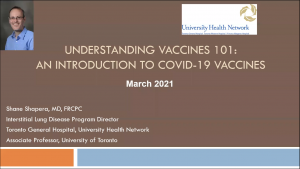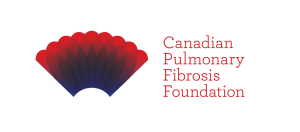May, 2021
CPFF Fellow makes substantial contributions to ILD research

In addition to caring for COVID-19 patients at Toronto General Hospital (TGH) for a 12-hour, night shift each week and managing patients in the ILD clinic, Dr. Colin Adams has made substantial progress on a number of ILD research projects as he completes his CPFF Robert Davidson Fellowship under the supervision of Dr. Shane Shapera, Director, Interstitial Lung Disease Program, TGH.
These projects include work on the development of a new prognostic (the likely course of a disease) score for all fibrotic ILDs; a study of the use of steroids following a “flare” or acute exacerbation (AE) of ILD; participation in MILDDER (Multidisciplinary ILD Discussion with Experts Remotely) and a study of the efficacy of antifibrotics after a decline in forced vital capacity (FVC) of 10 per cent or more in a six-month period.
When antifibrotic medications were introduced, a loss of 10 per cent or more of FVC within six months was arbitrarily determined as an indicator that the drugs were no longer working and the Ontario government would no longer cover the cost of the medications. For now, the pharmaceutical companies are covering the medication costs to continue the treatment for these patients.
Using the CARE-PF data, a national registry of about 3,900 ILD patients, Dr. Adams compared the FVC results for 110 IPF patients between those who continued their anti-fibrotic medication and those who did not after a 10 per cent decline. The results showed that those who continued their medication either improved or stabilized, but those who stopped their medication experienced a continuing decline in FVC.
The results of the study have been submitted to the journal Chest. CPFF will let you know when it is published. The results indicate to health care providers that whenever possible, antifibrotic medication should be continued following a decline in FVC. And it is encouraging news for patients who have experienced a decline in FVC.

“These study results importantly also provide the evidence we need to convince governments that they need to extend coverage of antifibrotics for those who experience a decline in FVC,” says Dr. Shapera.
Another study recently completed by Dr. Adams investigated the survival of ILD patients admitted to TGH between 2015 and 2019 for an acute exacerbation (AE), characterized by an increase in difficulty breathing over four weeks, with new changes on CT that are described as looking like glass that has been ground up into a fine powder (ground glass opacities).
“With ILD an acute exacerbation is rare, with about five per cent of patients experiencing such an event,” says Dr. Adams, “but, people are very sick and often die within three to four months following the event.”
This study looked at the way these patients were managed using a protocol developed by the ILD team at TGH, as well as looking at predictors of survival, without a lung transplant, one year afterward.
The 90 cases reviewed each had a CT scan at admission and received high doses of steroids in their first three days in hospital, gradually tapering off the drugs during the following four days, before having a second CT scan at day seven, to monitor the effectiveness of the treatment.
The results found that those with IPF did worse than those with other fibrotic lung diseases and that the patients who showed improvement on the second CT scan did better, over time, than those who did not show improvement in the day seven CT scan.
“The AE protocol with steroid treatment, has two benefits,” says Dr. Adams. “Patients live longer and they have less exposure to toxic medications, improving their quality of life. In addition, we can better discuss with patients their future options in light of the results of the second CT.” Dr. Adams hopes to one day develop a randomized clinical trial of this project on a national scale, to study whether “pulse dose” steroids are actually beneficial in treating acute exacerbations of ILD.
Dr. Adams has also been working on a national project, with Dr. Jolene Fisher at U of T and Dr. Chris Ryerson at UBC to develop a new prognostic score for all fibrotic ILD. Previous such scores are based on IPF patients only, or adapted from them.
“The CARE-PF data presents an opportunity to develop a new predictive tool using the large cohort of 3,900 fibrotic ILD patients, particularly in light of the recent clinical trial of Ofev showing a benefit for antifibrotics in all progressive, fibrotic ILD,” says Dr. Adams.
The subjects are split into two groups, with 1,900 in each. One group will be used to develop the model and the second group to test the model. The new prognostic score will help health care professionals determine when to start medications such as immunosuppressants and anti-fibrotics and study survival and the decline in FVC over two years from diagnosis. They will also compare the new model score to previous scoring methods.
“Overall the new prognostic score will help to frame discussions between physicians and patients on the probable progress of their disease and to refine the most beneficial treatment avenues for individuals,” says Dr. Adams.
“And in the case of government policy makers, it will help to identify who can expect improved outcomes from specific treatments,” says Dr. Shapera.
In addition to research and patient care, CPFF Fellows make connections within the Canadian ILD clinical and research communities and present their findings, teach more junior team members and participate in multidisciplinary discussions for case management.
Dr. Adams has been able to participate in a unique project at TGH called MILDDER (Multidisciplinary ILD Discussion with Experts Remotely). This project serves as a remote multidisciplinary discussion (MDD) for healthcare centres in Ontario without access to ILD specialists. The project is now in its second year and is collecting data on patient outcomes from referring participants and from an educational perspective for both referring health care providers and those who participate to learn more about treating ILD. Continuing medical education (CME) credits are available for those who participate.
“MILDDER sessions present an excellent opportunity for community outreach and provide quicker access to specialized care for those living outside of the Toronto area,” reports Dr. Adams.
As he completes his CPFF Robert Davidson Fellowship, Dr. Adams is grateful for the opportunity it has given him, expanding his experience and insights in the ILD field. He hopes to continue his research and clinical work in a large ILD centre.
Dr. Shapera also extends his thanks to CPFF donors and sponsors, who have made it possible for CPFF to fund fellowships across Canada. “Of the five previous CPFF fellows we have had at TGH, two are now U of T faculty members, passing along their knowledge and continuing research. One fellow is practicing at another centre in Toronto and two others are ILD specialists in the east and west ends of the Greater Toronto Area, increasing access to care. The impact of these CPFF fellowships cannot be underestimated and we are very pleased to work with CPFF to improve access to care and advance research for the ILD community in Canada.”

We hope by now, most Canadians with pulmonary fibrosis and their caregivers have received at least a first dose of a COVID-19 vaccine, or secured an appointment for one soon. If not, please keep trying.
“If you have pulmonary fibrosis, I encourage you to receive any COVID-19 vaccine, as soon as it is offered to you,” says Dr. Shane Shapera, Director of the Interstitial Lung Diseases Program at the Toronto General Hospital, UHN and a member of CPFF’s Medical Advisory Board.
“The risk of serious illness or death from COVID-19 for people with ILD far outweighs any small risks that may be associated with the vaccines. And, there is no evidence of adverse interaction between anti-fibrotic medications used to treat ILDs and the vaccines.”
If you have received a first dose, remember to continue to observe public health regulations and wear a mask and maintain social distancing.
If you have questions about the vaccines, you may want to watch Dr. Shapera’s presentation, which offers an overview of the COVID-19 vaccines and how they work, as well as considerations for those living with ILD. Please note that the information about the vaccine roll-out and distribution applies only to Ontario. Vaccine distribution, priority access and timelines will differ in other provinces and territories.
For personal information about whether you should receive a COVID-19 vaccine, consult your health care provider or ILD specialist for an individual risk/benefit assessment based on your current medical condition and medical history as well as COVID-19 vaccine label information on contraindications, special warnings and precautions and drug interactions.
CPFF seeking two new Board members

As Canada’s only national charitable organization supporting Pulmonary Fibrosis (PF) patient care, research, education and advocacy, the Canadian Pulmonary Fibrosis Foundation (CPFF) has a well-earned reputation for excellence in the community, across Canada and internationally.
The Foundation is seeking a proactive individual with passion and drive to bring about positive change in the life of those affected by pulmonary fibrosis. At this time, we are specifically searching for two individuals: one who is a person living with PF and another with legal experience and knowledge.
The Canadian Pulmonary Fibrosis Foundation (CPFF) board members are active participants in the activities of the CPFF. They are accountable for the performance of CPFF in relation to its mission and strategic objectives and for the effective stewardship of financial and human resources. In addition to providing overall direction for the foundation, the board members undertake specific activities related to fundraising, awareness, support and advocacy.
The expectation of all board members is to:
- Prepare for, attend, and conscientiously participate in monthly prescheduled board meetings
- Actively participate in projects and committees of the CPFF
- Participate in fundraising for the CPFF
- Serve as active advocates and ambassadors for the organization
- Contribute approximately six to ten hours per month (board meetings, preparing for board meetings, participating in committees, attending special events.) More time may be necessary when working on a fundraiser or a special project.
This is a three-year term, renewable three times if the individual wishes.
As the highest leadership body of the organization and to satisfy its fiduciary duties, the board is responsible for:
- Determining the mission and purpose of the organization and as authorized by Canada Revenue Agency (CRA)
- Selecting and evaluating the performance of the Executive Director
- Strategic and organizational planning
- Fundraising and resource development
- Ensuring strong fiduciary oversight and financial management
- Assessing its own performance as the governing body of CPFF
- Approving and monitoring CPFF’s programs and services.
The goals of the CPFF Board of Directors are to provide structure, support and guidance to the CPFF’s mission to fund research, provide patient support and raise awareness of pulmonary fibrosis. The CPFF works closely with the medical community and with support from Canadians we hope to achieve our vision, mission and objectives. Please send your covering letter and resume to [email protected] by June 15, 2021.
New video offers a simple overview of PF

If you, or someone you care about, is living with pulmonary fibrosis this is a must-watch video. It can be overwhelming to receive a pulmonary fibrosis diagnosis, and until you become involved with the pulmonary fibrosis community or a specialized clinic, it can be tough to learn about this disease.
In this CPFF educational video, Dr. Charlene Fell explains in an easy-to-understand way, what pulmonary fibrosis is, what you can expect, and how to manage the disease so you can live life as fully as possible.
Pulmonary fibrosis (or PF) is the common term used to describe a large family of diseases that cause inflammation and scarring in the lungs. The medical term is Interstitial Lung Disease or ILD. Watch this video for a quick overview, and share it with your friends and family to help them learn about pulmonary fibrosis.
The video is also an excellent tool for health care professionals, who may be looking for another way to explain the disease to a patient.
CPFF also has a much longer presentation by Dr. Fell available online, called “I’ve been diagnosed with pulmonary fibrosis – now what?”
Dr. Charlene Fell
Dr. Fell is the Chair of CPFF’s Medical Advisory Board, the founding chair of the Canadian Thoracic Society’s Clinical Assembly on Interstitial Lung Diseases and the Director of the University of Calgary Interstitial Lung Disease Program. She has dedicated her research efforts to unraveling the mystery of IPF and making a difference in the lives of patients and their caregivers living with the disease.
****
 A French version of the video by Dr. Ilan Azuelos is available here.
A French version of the video by Dr. Ilan Azuelos is available here.
Promoting Awareness Month during the pandemic – again

September is Pulmonary Fibrosis Awareness Month, and once again most of our activities and events will be virtual. While it is disappointing to not participate or gather in person, last year’s virtual education sessions and online activities were a big hit and were better than ever in terms of increasing awareness and raising funds for the cause.
Throughout this pandemic, we have stood together in spirit, even though we remain apart physically. We are all hopeful that with vaccines ramping up, the end of this crisis is near. And with many people experiencing the breathlessness that can be a symptom of the virus, our stories of life with PF are resonating even more strongly with the media, governments, and the public.
May and June are the perfect months for you to approach your local town or city council to request the lighting of landmarks, such as clock towers, sports venues, fairgrounds, town halls and city signs during September. Now is also the time to ask your mayor, premier or health minister to issue a town, city or provincial proclamation declaring September as Pulmonary Fibrosis Awareness Month.
To accommodate COVID-19 restrictions, we are once again asking elected officials to send us a video of them making the proclamation. You can find some sample proclamations on our Hope Breathes Here campaign website.
Most landmark lighting and proclamation requests can be made online. Please be sure to let Sharon Lee [email protected] know about the requests you submit to prevent duplicate requests. You can find the information you need to complete such requests on our website.
Be sure to follow us on Facebook and Twitter for updates throughout the summer on plans for PF Awareness Month and visit our website to find out how you can get involved this year. Despite the pandemic, we can still accomplish so much for our PF community when we encourage one another remotely.
CPFF recognized for research funding

Last month, CPFF received a silver Upper Canada Medal from the Toronto General & Western Hospital Foundation in recognition of our contributions to excellence in health care. Silver-level medals are awarded for support totaling $500,000 or more. To date, CPFF has granted the foundation more than $540,000 to fund a number of ILD research initiatives.
In addition to last year’s $90,000 CPFF Robert Davidson Fellowship award to Dr. Colin Adams, CPFF has funded five previous fellowships at Toronto General Hospital and several research grants. You can read about some of the work done by Dr. Adams in the first article in this issue of Hope Breathes Here.
We appreciate this recognition of our support by the foundation,” says Sharon Lee, Executive Director of CPFF, “but, more importantly, we are proud to fund the fellowships and research projects conducted by the ILD program team at TGH, which help improve access to care and advances ILD research to the benefit of everyone in the Canadian PF Community.”

The ILD program at Queen’s University and Kingston Health Sciences Center is pleased to offer the Ruth Pattenden Fellowship, which provides financial support ($90,000 dollars) to applicants accepted into the ILD Fellowship Program, with the expectation to dedicate time to ILD research.
It is a 12-month program that provides training in the diagnosis and management of interstitial lung diseases. ILD Fellows have rotations in rheumatology, the advanced dyspnea clinic and thoracic surgery. The program includes training in transbronchial lung cryobiopsy, weekly bronchoscopy results review and patient care planning sessions, monthly ILD journal club, ILD-rheumatology sessions and ILD rounds with multidisciplinary discussions with respirology, chest radiology and lung pathology.
Applicants must hold a certification in Internal Medicine and must have obtained -or eligible to obtain- certification in Adult Respirology.
Applications should be submitted to Dr. Onofre Moran ([email protected]) and should include:
- Application Letter (free format)
- CV
- Copy of MD and specialist certification (Internal Medicine and /or Respirology)
- 3 Reference letters, at least one from the Respirology Program Director and from the Internal Medicine Program Director.
Application deadline is May 28, 2021 to start in July 2021


